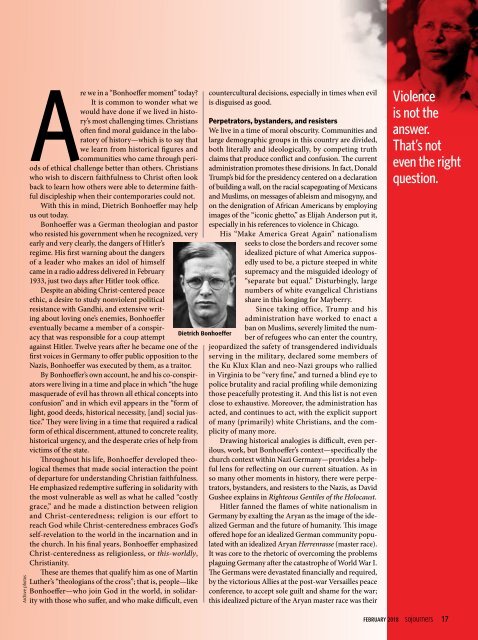february-2018
You also want an ePaper? Increase the reach of your titles
YUMPU automatically turns print PDFs into web optimized ePapers that Google loves.
Archive photos<br />
Are we in a “Bonhoeffer moment” today?<br />
It is common to wonder what we<br />
would have done if we lived in history’s<br />
most challenging times. Christians<br />
often find moral guidance in the laboratory<br />
of history—which is to say that<br />
we learn from historical figures and<br />
communities who came through periods<br />
of ethical challenge better than others. Christians<br />
who wish to discern faithfulness to Christ often look<br />
back to learn how others were able to determine faithful<br />
discipleship when their contemporaries could not.<br />
With this in mind, Dietrich Bonhoeffer may help<br />
us out today.<br />
Bonhoeffer was a German theologian and pastor<br />
who resisted his government when he recognized, very<br />
early and very clearly, the dangers of Hitler’s<br />
regime. His first warning about the dangers<br />
of a leader who makes an idol of himself<br />
came in a radio address delivered in February<br />
1933, just two days after Hitler took office.<br />
Despite an abiding Christ-centered peace<br />
ethic, a desire to study nonviolent political<br />
resistance with Gandhi, and extensive writing<br />
about loving one’s enemies, Bonhoeffer<br />
eventually became a member of a conspiracy<br />
that was responsible for a coup attempt<br />
against Hitler. Twelve years after he became one of the<br />
first voices in Germany to offer public opposition to the<br />
Nazis, Bonhoeffer was executed by them, as a traitor.<br />
By Bonhoeffer’s own account, he and his co-conspirators<br />
were living in a time and place in which “the huge<br />
masquerade of evil has thrown all ethical concepts into<br />
confusion” and in which evil appears in the “form of<br />
light, good deeds, historical necessity, [and] social justice.”<br />
They were living in a time that required a radical<br />
form of ethical discernment, attuned to concrete reality,<br />
historical urgency, and the desperate cries of help from<br />
victims of the state.<br />
Throughout his life, Bonhoeffer developed theological<br />
themes that made social interaction the point<br />
of departure for understanding Christian faithfulness.<br />
He emphasized redemptive suffering in solidarity with<br />
the most vulnerable as well as what he called “costly<br />
grace,” and he made a distinction between religion<br />
and Christ-centeredness; religion is our effort to<br />
reach God while Christ-centeredness embraces God’s<br />
self-revelation to the world in the incarnation and in<br />
the church. In his final years, Bonhoeffer emphasized<br />
Christ-centeredness as religionless, or this-worldly,<br />
Christianity.<br />
These are themes that qualify him as one of Martin<br />
Luther’s “theologians of the cross”; that is, people—like<br />
Bonhoeffer—who join God in the world, in solidarity<br />
with those who suffer, and who make difficult, even<br />
Dietrich Bonhoeffer<br />
countercultural decisions, especially in times when evil<br />
is disguised as good.<br />
Perpetrators, bystanders, and resisters<br />
We live in a time of moral obscurity. Communities and<br />
large demographic groups in this country are divided,<br />
both literally and ideologically, by competing truth<br />
claims that produce conflict and confusion. The current<br />
administration promotes these divisions. In fact, Donald<br />
Trump’s bid for the presidency centered on a declaration<br />
of building a wall, on the racial scapegoating of Mexicans<br />
and Muslims, on messages of ableism and misogyny, and<br />
on the denigration of African Americans by employing<br />
images of the “iconic ghetto,” as Elijah Anderson put it,<br />
especially in his references to violence in Chicago.<br />
His “Make America Great Again” nationalism<br />
seeks to close the borders and recover some<br />
idealized picture of what America supposedly<br />
used to be, a picture steeped in white<br />
supremacy and the misguided ideology of<br />
“separate but equal.” Disturbingly, large<br />
numbers of white evangelical Christians<br />
share in this longing for Mayberry.<br />
Since taking office, Trump and his<br />
administration have worked to enact a<br />
ban on Muslims, severely limited the number<br />
of refugees who can enter the country,<br />
jeopardized the safety of transgendered individuals<br />
serving in the military, declared some members of<br />
the Ku Klux Klan and neo-Nazi groups who rallied<br />
in Virginia to be “very fine,” and turned a blind eye to<br />
police brutality and racial profiling while demonizing<br />
those peacefully protesting it. And this list is not even<br />
close to exhaustive. Moreover, the administration has<br />
acted, and continues to act, with the explicit support<br />
of many (primarily) white Christians, and the complicity<br />
of many more.<br />
Drawing historical analogies is difficult, even perilous,<br />
work, but Bonhoeffer’s context—specifically the<br />
church context within Nazi Germany—provides a helpful<br />
lens for reflecting on our current situation. As in<br />
so many other moments in history, there were perpetrators,<br />
bystanders, and resisters to the Nazis, as David<br />
Gushee explains in Righteous Gentiles of the Holocaust.<br />
Hitler fanned the flames of white nationalism in<br />
Germany by exalting the Aryan as the image of the idealized<br />
German and the future of humanity. This image<br />
offered hope for an idealized German community populated<br />
with an idealized Aryan Herrenrasse (master race).<br />
It was core to the rhetoric of overcoming the problems<br />
plaguing Germany after the catastrophe of World War I.<br />
The Germans were devastated financially and required,<br />
by the victorious Allies at the post-war Versailles peace<br />
conference, to accept sole guilt and shame for the war;<br />
this idealized picture of the Aryan master race was their<br />
Violence<br />
is not the<br />
answer.<br />
That’s not<br />
even the right<br />
question.<br />
FEBRUARY <strong>2018</strong> sojourners 17


